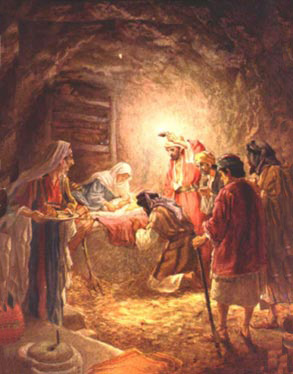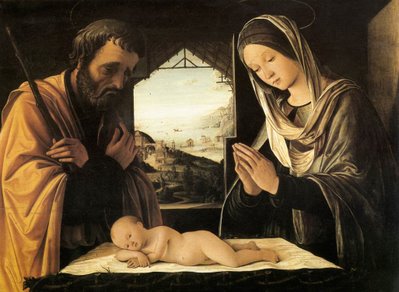
There is a very widespread theory that Christmas began in Rome as a response to pagan festivities centering around the winter solstice, which was locally considered to be 25 December. The pagan celebration, which was first established by the Roman emperor Aurelian in AD 274, was called The Birth of the Invincible Sun. However, there is evidence that, some years earlier, Christians had made a sincere attempt to calculate the actual date of Jesus’ birthday. People commonly believe that Christmas was instituted on the date of a pagan holiday to supplant it, but it was actually the other way around. Christmas was there first.

In ancient Judaism, there was a common belief, which ancient Christians inherited, that the prophets of Israel died on the on the same date as their birth or conception. This may be behind the long-standing Christian custom of referring to the date of a martyr’s death as their “birthday in heaven.” According to ancient western calculations, Jesus was crucified on 25 March, so they assumed that 25 March was the date of Jesus’ conception. The Annunciation is still commemorated on that date to this day. Nine months after 25 March leads to 25 December, which would be the birthday of Jesus Christ if all those assumptions and calculations were correct. They aren’t correct, but the fact remains that the date has a Christian origin. footnote
In AD 354, Philocalus wrote a Christian martyrology that dates the nativity of Jesus Christ on December 25, and cites an earlier work as backup. From this we can deduce that Christmas was celebrated on the present date at least as early as AD 335 in Rome.
Christmas failed to gain prominent or even universal recognition among Christians until quite recently. In some protestant-dominated areas, such as the Massachusetts Bay Colony, the celebration of Christmas was even legally banned, probably as part of their rejection of those parts of the traditional liturgical calendar that have no apparent foundation in Scripture. As late as the last century, Christmas had gained no great importance; it was not even a legal holiday. This explains why nineteenth-century readers found it credible that Scrooge could require Cratchit to come to work on Christmas Day and why in the nineteenth century the US Congress could meet on Christmas Day.

The origins of Saint Nicholas, Santa Claus, presents, and trees
Saint Nicholas Day (December 6) was the traditional day for giving gifts to children. It is still the day on which children receive gifts from St. Nicholas in the Netherlands. Epiphany (January 6) is, in the western Church, the commemoration of day on which the three kings presented the baby Jesus with gifts.
Saint Nicholas was the bishop of Myra in Lycia, which is in modern Turkey, sometime before AD 350. Nothing is known of his life except for the legends that have built up around him, but he was associated with kindness to children. He was a widely admired saint throughout the eastern and western churches. The Dutch custom of giving presents to children on St. Nicholas Day was brought to America by early Dutch settlers in New Amsterdam, which was renamed New York when the British took over the colony. Santa Claus is the American pronunciation of Sinter Klaas, which was colloquial Dutch for Saint Nicholas.
In the US, gifts are now exchanged on Christmas Day in a sort of compromise of Dutch, German, and British gift-giving customs. The Christmas tree is a Christianized pagan custom that originated in Germany. German settlers introduced it in America. It became popular during the nineteenth century, and then later spread to Britain and Japan from the US.
No comments:
Post a Comment